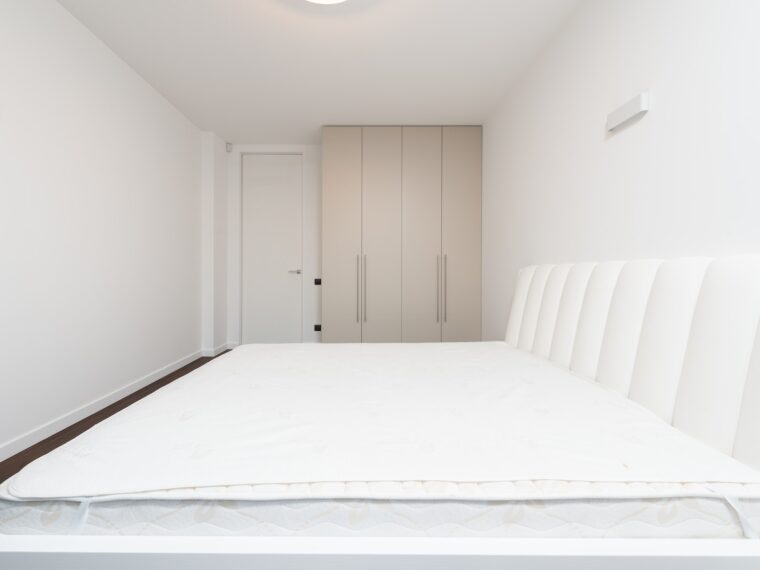As your mattress ages, it may cause back pain and other sleep-related issues. Knowing when it is time for a replacement mattress can help ensure a more restful night’s rest.
Mattresses typically last between 7-10 years. But their lifespan depends on many different factors including:
Material
Material choice when manufacturing mattresses has an immense effect on their lifespan. Some materials are more resilient than others and can withstand wear and tear better, thus explaining why mattresses made of high-density polyfoam or latex tend to outlive innerspring and hybrid mattresses made with low-density polyfoam or synthetic latex. Durability also depends on usage; mattresses used frequently by children or pets will wear down faster than ones only used for sleeping purposes.
Body weight also affects a mattress’s longevity. Heavier sleepers will exert more pressure on it, leading to faster wear-and-tear of shared mattresses than single person ones. Additionally, mattresses used by two individuals simultaneously will wear out faster.
Environmentally speaking, mattress production and disposal can have a major effect. Mattresses made of foam, wood, metal and other non-biodegradable materials often contribute to soil and water contamination if discarded improperly; furthermore their bulkiness increases carbon emissions from transporting them to landfills.
Mattress quality construction also plays a direct role in its lifespan; for instance, one with poor-grade innerspring core will degrade significantly more rapidly than one featuring resilient spring steel cores of quality construction. Furthermore, chemicals used during production of mattresses may have negative environmental ramifications if handled or stored incorrectly; it is therefore crucial that one purchases their mattress from a reputable company that employs green manufacturing practices such as recycling to minimize its ecological footprint.
Design
Mattress lifespan typically lasts seven to ten years. Many factors will influence when is the best time for you to replace a mattress; its original quality when purchased and how frequently used will both have an effect.
Memory foam mattresses tend to outlive innerspring mattresses in terms of lifespan, while your foundation type (i.e. an inexpensive box spring will wear down faster than an expensive hybrid mattress). Furthermore, weight and size have an impact; heavier people often experience mattress sag quicker than lighter individuals while sleeping with partners can require frequent replacement of mattresses.
A quality mattress should provide comfort, support and pressure relief throughout the night for optimal restorative results. When this doesn’t happen it could be time to upgrade. Signs your current mattress is time for replacement may include back pain, stiffness or other forms of discomfort upon waking, visible sagging or body impressions as well as diminished ability to isolate motion or keep you cool and comfortable throughout the night.
Sleeping Position
Mattresses are significant investments that can have a dramatic effect on both your physical and mental wellbeing. Though you have limited control over how long a mattress will last, there are still ways you can extend its lifecycle.
Sleep Position – How you sleep can also have an effect on how long your mattress lasts. For instance, side sleepers may see their mattress sag more quickly than back or stomach sleepers; to counter this issue, choose a mattress designed specifically for side sleeping or invest in a pillow that helps facilitate restful slumber when on your side.
Original Quality – When purchasing your mattress, its initial quality can have an enormous effect on its lifespan. A less expensive mattress will likely wear out faster.
Mattress Material Type – Mattresses made from latex or memory foams have the longest lifespan; polyfoams or lower density memory foams tend to have shorter lives. Hybrid mattresses with coils also tend to last less than traditional innerspring models.
Weight and size can also impact how long a mattress will last, with heavier sleepers experiencing their mattress starting to sag more quickly while lighter sleepers having less of an effect. You can help prolong its longevity by rotating it every three months (unless recommended by its manufacturer), as well as using a mattress protector against spills, stains, or dust build-up.
Care for your mattress properly, and it should outlive one neglected. Regular rotation, keeping it clean, and using a protector could extend its lifespan by as much as 15 years; otherwise you should expect it to only last 9 years or less. Frequency of use also plays a part; an occasional user might see longer results than someone who sleeps on their mattress each night.
Care
An expensive mattress investment, you want to protect its quality as much as possible for as long as possible. One way to extend its lifespan is through proper care and maintenance: keeping it clean, rotating it regularly and immediately removing stains as they appear. Furthermore, making sure it has an appropriate foundation will preserve materials while helping prevent premature sagging.
A quality mattress should provide restful night’s rest while supporting your natural posture while sleeping. In an ideal world, you should wake up feeling rejuvenated and ready to face each new day – but if aches and pains wake you up regularly or your mattress no longer provides sufficient support, then now may be an opportune time to replace it.
Your mattress’ lifespan depends on several factors, including its construction materials and your sleeping habits and position. A high-quality, long-lasting mattress could last 10+ years with proper care; if neglected however, sooner replacement may be necessary.
Signs that it’s time for a new mattress include experiencing back or neck pain on waking, which indicates an insufficiently supportive surface can contribute to health problems such as reduced energy and stress levels.
No matter the type of mattress you own, all mattresses require regular care to remain in good condition. In general, regular cleaning, protecting it with a protective cover and following manufacturer care guidelines can extend its life considerably.
Make sure your mattress has adequate support, as this will significantly extend its lifespan. Many people purchase a box spring or foundation for their mattress to protect the material integrity and reduce premature wear and tear. If in doubt about which foundation would best suit your mattress, consult its warranty policy or speak to the manufacturer of said mattress for recommendations.




